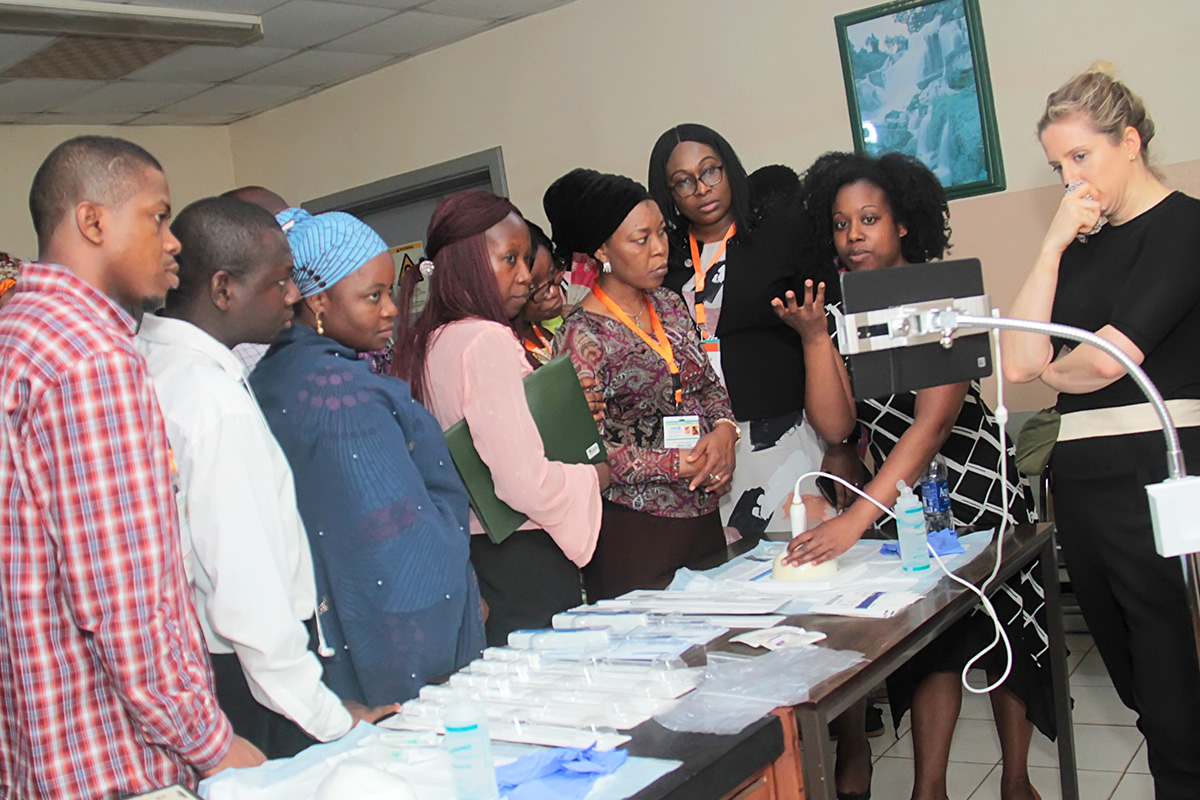
The GCRT program and the ARGO consortium focus on clinically meaningful research questions. Our goal is to combine research, capacity building, and patient care in projects that will lead to a long-term, sustainable improvement in outcomes for people with cancer. While initially we focused on colorectal cancer, once a robust ARGO infrastructure was established, we expanded our efforts to breast cancer. We envision additional expansion to include other cancer types that disproportionately affect patients in low- and middle-income countries (LMICs) in future research projects. Current and planned research studies are described below.
- Prospective collection and banking of colorectal cancer specimens and a database containing clinical information
- Development and testing of a point-of-care urine-based screening test for colorectal cancer in Nigeria (supported by NIH/NCI grant UH3CA257869-03)
- A multidisciplinary study to determine the risk-factor profile and biology of colorectal cancer in Nigeria (supported by NIH/NCI grant R01CA246620-01A1)
- Microbiome study in Nigerian patients with colorectal cancer
- Investigation of the utility of fecal immunochemical testing (FIT) in the Nigerian population (supported by the Prevent Cancer Foundation)
- Qualitative study of Nigerian patient perceptions and knowledge of colorectal cancer
- Comparison of outcomes and biology of colorectal tumors between MSK and Nigerian patients
Our collaborative approach to breast cancer research centers on the WHO Global Breast Cancer Initiative 3 Pillars of action
Pillar 1: Health Promotion and Early Diagnosis
- Study of iBreast, a handheld device for detecting breast tumors, in Nigeria
- Access to Breast Cancer Screening and Treatment in Nigeria: The Triple Mobile Assessment and Patient Navigation Model
- Access to Essential Breast Imaging in Nigeria
Pillar 2: Timely Breast Diagnostics
- Pilot study of ultrasound-guided breast biopsy in Nigeria (supported by NIH/NCI R21CA239784-01)
- Establishing Early Breast Cancer Diagnosis in Nigeria – The Pathology Perspective
- Needs Assessment and Pathway to Consistent Breast Pathology Reports in Africa
- MSK Global Pathology Academy: Developing an Online Breast Pathology Fellowship
- Assessment of Diagnostic Performance of an Artificial Intelligence Tool To Support Clinical Decision-Making of Sonographic Breast Findings
Pillar 3: Comprehensive Breast Cancer Management
- A retrospective breast radiotherapy needs assessment of Nigerian breast cancer patients
- Pilot study of quality of life among Nigerian women with breast cancer, post-mastectomy and treated with adjuvant chemotherapy
- Prospective collection and banking of breast cancer specimens and a database containing clinical information
- Addressing global inequities in breast cancer genetic testing, counselling and management among breast cancer patients in Nigeria
- The clinicopathological and psychosocial profile of breast cancer survivors in a Nigerian cohort: A mixed-method analysis
- Retrospective analysis of NCCN sub-Saharan Africa Guideline concordance and survival outcomes in non-metastatic breast cancer patients in Nigeria
- Psychosocial impact of breast cancer surgery in Nigeria
- Improving Guideline-Concordant Breast Cancer Treatment and Quality Oncology Care Delivery in Nigeria
- Evaluating the prevalence and determinants of breast cancer-related Lymphoedema
- Molecular profile of TNBC in Nigeria vs. North America
- Out-of-pocket cost of breast cancer care in Nigeria
- Pilot study of white adipose tissue inflammation (WATI) in Nigerian patients with breast cancer
- Analysis of a Nigerian gastric cancer database
- Study of the financial toxicity of oncology care in Nigeria
- Evaluation of how distance to a cancer center impacts oncology outcomes in Nigerian patients
- Diabetes study led by the National Institutes of Health (NIH) and endocrinologists in Nigeria to determine the optimal diagnostic test for diabetes mellitus in Nigeria; a cohort of patients with diabetes will be followed to determine cancer risks